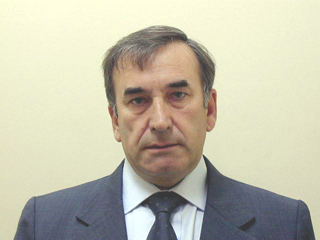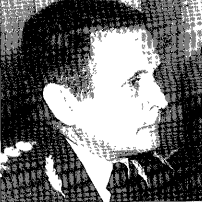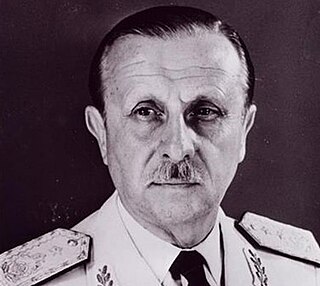Related Research Articles

Jorge Rafael Videla was an Argentine military officer and dictator who was the 47th President of Argentina and as well as the 1st President of the National Reorganisation Process from 1976 to 1981. His rule, which was during the time of Operation Condor, was among the most infamous in Latin America during the Cold War due to its high level of human rights abuses and severe economic mismanagement.

The Dirty War is the name used by the military junta or civic-military dictatorship of Argentina for its period of state terrorism in Argentina from 1974 to 1983 as a part of Operation Condor. During this campaign, military and security forces and death squads in the form of the Argentine Anticommunist Alliance hunted down any political dissidents and anyone believed to be associated with socialism, left-wing Peronism, or the Montoneros movement.
Alfredo Ignacio Astiz is a convicted war criminal and former Argentine military commander, intelligence officer, and naval commando who served in the Argentine Navy during the military dictatorship of Jorge Rafael Videla during the Proceso de Reorganización Nacional (1976–1983). He was known as El Ángel Rubio de la Muerte, and had a reputation as a torturer. He was discharged from the military in 1998 after defending his actions in a press interview.
At the national level, Argentina elects a head of state and a legislature. The franchise extends to all citizens aged 16 and over, and voting is mandatory for all those who are between 18 and 70 years of age.

Mauricio Macri is an Argentine businessman and politician who served as the President of Argentina from 2015 to 2019. He has been the leader of the Republican Proposal (PRO) party since its founding in 2005. He previously served as 5th Chief of Government of Buenos Aires from 2007 to 2015, and was a member of the Chamber of Deputies representing Buenos Aires from 2005 to 2007. Ideologically, he identifies himself as a liberal and conservative on the Argentine centre-right.
Christian Federico von Wernich is an Argentine Roman Catholic priest and a former chaplain of the Buenos Aires Province Police while it was under the command of General Ramón Camps, during the dictatorial period known as the National Reorganization Process (1976–1983). Wernich worked in Miguel Etchecolatz's Direction of Investigations of the provincial police with the rank of Inspector. He became internationally known in 2006 after being indicted for murder and kidnapping in aid of the military junta; he was convicted at trial in October 2007 and sentenced to life imprisonment.

Luciano Benjamín Menéndez was an Argentine general and convicted human rights violator and murderer. Commander of the Third Army Corps (1975–79), he played a prominent role in the murders of social activists.

The Full stop law, Ley de Punto Final, was passed by the National Congress of Argentina in 1986, three years after the end of the military dictatorship of the Proceso de Reorganización Nacional and restoration of democracy. Formally, this law is referred to by number, like all others in Argentine legislation, but Ley de Punto Final is the designation in common use, even in official speeches.
The Trial of the Juntas was the judicial trial of the members of the de facto military government that ruled Argentina during the dictatorship of the Proceso de Reorganización Nacional, which lasted from 1976 to 1983. It is so far the only example of such a large scale procedure by a democratic government against a former dictatorial government of the same country in Latin America.

Luis Abelardo Patti is an Argentine convicted criminal, politician, and former senior police officer, sentenced to life imprisonment for his involvement in torture and murder during the 1970s. He is the leader of the conservative Federalist Union Party.

Miguel Osvaldo Etchecolatz was an Argentine police officer, who worked in the Buenos Aires Provincial Police during the first years of the military dictatorship of the 1970s, known as the National Reorganization Process, which Etchecolatz was deeply involved in. He was first convicted of crimes committed during this period in 1986; the full stop law, which passed that year and created amnesty for security officers, meant that he was released without a sentence. In 2003, Congress repealed the law and the government re-opened prosecution of crimes committed during the Dirty War.
Ricardo Miguel Cavallo is a retired Argentine naval lieutenant commander. Under the name Miguel Angel Cavallo, he served as an officer of the National Reorganization Process, which ruled Argentina from 1976 to 1983. On the basis of his activities in secret G-322 operations, he was later charged with kidnapping, torture, and/or murder, of hundreds of political dissidents.
The history of human rights in Argentina is affected by the last civil-military dictatorship in the country (1976-1983) and its aftermath. The dictatorship is known in North America as the "Dirty War", a named coined by the dictatorship itself to justify their actions of State-sponsored terrorism against Argentine citizenry, which were backed by the United States as part of their planned Operation Condor, and carried out primarily by Jorge Rafael Videla's de facto rule (1976-1981), but also after it and until democracy was restored in 1983. However, the human rights situation in Argentina has improved significantly since the end of the dictatorship.

The Secret in Their Eyes is a 2009 Argentine crime drama film produced, edited, and directed by Juan José Campanella from a screenplay by Campanella and Eduardo Sacheri, and based on Sacheri's 2005 novel La pregunta de sus ojos. It stars Ricardo Darín, Soledad Villamil, Pablo Rago, Javier Godino, and Guillermo Francella. The film focuses on the relationship between judiciary agents Benjamín Espósito (Darín) and Irene Hastings (Villamil) and their investigation into a murder case in 1970s Argentina.

Omar Domingo Rubens Graffigna was an Argentine Air Force officer who served in the second military junta of the National Reorganization Process dictatorship. Along with Santiago Omar Riveros, he was one of the last two surviving members of the dictatorship. On 8 September 2016 he was sentenced to 25 years' imprisonment for crimes during the dictatorship.

The Voluntary Interruption of Pregnancy Law was approved by the National Congress of Argentina in 2020, legalizing abortion in Argentina. The first draft of the bill was created in 2006 by the National Campaign for the Right to Legal, Safe, and Free Abortion, which sought to have Congress consider it in seven different occasions, to no avail.
The notebook scandal or graft scandal took place in Argentina in 2018. It was started by the driver Óscar Centeno, who had worked for public officials during the presidencies of Néstor and Cristina Fernández de Kirchner, and denounced an organized corruption scheme. According to notes that he had kept in personal notebooks, he had frequently carried bags filled with US dollars to several locations, including public buildings and even the personal house of Cristina Fernández de Kirchner. Those bags would be payments for bribes.
Julio Héctor Simón, nom-de-guerreTurco Julián, is an Argentinian former police officer. He was known for being a torturer during the National Reorganization Process in Argentina. His case was famous due to his brutality and revindication of Nazi ideas, but also after a presidential pardon of president Carlos Menem he started to make appearances in television and confrontation with some of his old victims.

The Posadas Hospital Trial is the name given to the court case for crimes against humanity committed in the clandestine detention center (Argentina) called "El Chalet", located inside the Posadas Hospital, during the military dictatorship called the National Reorganization Process.
In Argentina, the term "impunity laws" refers to two laws and a series of presidential decrees enacted between 1986 and 1990, which prevented the prosecution or execution of convictions against perpetrators of crimes against humanity during the state terrorism carried out by the Military Junta in the 1976 civil-military coup d'état, which governed from 1976 to 1983. On May 3, 2017, the Supreme Court issued a ruling that allows the sentences of persons found guilty of crimes against humanity to be significantly reduced, by application of the so-called "two for one".
References
- ↑ Martín Rodríguez Yebra (May 10, 2001). "Inseguridad: derogaron la polémica ley del 2x1" [Insecurity: the controversial 2x1 law was derogated] (in Spanish). La Nación. Retrieved September 3, 2015.
- ↑ Bertoia, Luciana (September 15, 2018). "Luis Muiña handed life in jail for dictatorship-era murder at Posadas hospital". Buenos Aires Times. Retrieved June 10, 2020.
- 1 2 3 "El extenso camino de de la Corte para declarar inaplicable el 2x1 a represores" [The long path of the Court to declare the 2x1 unavailable for repressors] (in Spanish). La Nación. December 4, 2018. Retrieved December 4, 2018.
- ↑ Novaro, pp. 27-28